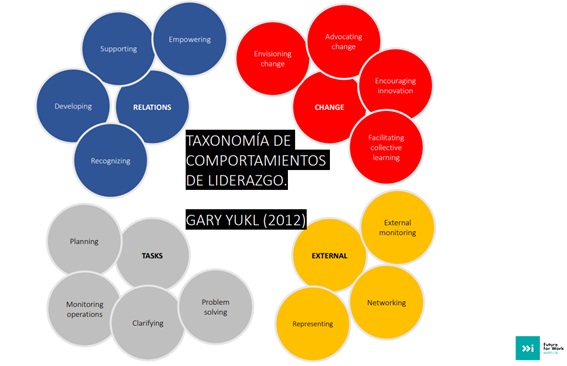
Álvaro Cárcel, Partner.
In today’s business world, managing a managerial career goes far beyond simply achieving goals and leading teams. One of the key, but often underestimated, aspects of effectively managing a managerial career is the development of professional networks and relationships.
In fact, if we take as a frame of reference the taxonomy of leadership behaviors proposed by Gary Yulk, there are 4 major key blocks, with their associated behaviors, that every leader should take into account and master as much as possible, as can be seen in the image below:

The “external relations” block goes far beyond creating simple contacts. These are aspects such as acting as a representative or ambassador of the company to the outside, being in touch with what is happening in the sector and in the competition, and obviously the creation of solid relationships with relevant people.
All of this constitutes an invaluable asset that can boost professional and business success. As leaders, we have an obligation to cultivate and maintain these networks, not only for our own benefit, but also for the benefit of our organization and team.
What are the reasons?
First, professional networks can provide opportunities for learning and growth. By connecting with colleagues, mentors, and experts in our industry, we have access to knowledge, experiences, and information that can enrich our own understanding and skills.
In addition, professional networks can be a source of support and guidance. In times of challenge or uncertainty (very common today), having a network of colleagues and mentors to rely on can offer advice, serenity, perspective, and the support needed to make informed decisions and overcome difficult times.
But perhaps most importantly, professional networking and relationships can be critical to achieving business goals. By building and maintaining relationships with colleagues, business partners, and industry leaders, we are able to establish strategic alliances, collaborations, and growth opportunities that might otherwise be out of reach. We are increasingly moving in collaborative networking environments, and today, most business success stories are built through collaboration.
The question is: how can we fulfill this directive obligation to develop effective professional networks and relationships?
Like any habit, it requires planning and effort. The easiest thing to do is to focus on operations and not “waste time” on aspects that are not strictly related to day-to-day priorities. The difficult, but crucial part of achieving the goal, is to be proactive in building our networks, first identifying, and then participating in industry events, seminars, conferences and networking groups. Therefore, it requires a prior analysis and a good selection of the circles in which one should invest one’s time.
And very important. It’s not just about “being there for the sake of being”, it’s about actively participating, and contributing selflessly. Whatever we bring to the table as leaders, sooner rather than later we will receive back in spades, so we must dedicate time and effort to maintaining and nurturing these relationships, maintaining regular contact, providing mutual support, and looking for opportunities for collaboration.
In conclusion: developing professional networks and relationships is not just an option for leaders; it’s an obligation. By investing in the development of our networks, we are not only investing in our own success, but also in the continued success of our organization and team.














Playkaro247 is a decent option for casual gaming. Nothing super mind-blowing, but a solid choice if you’re looking for a new place to try your luck. playkaro247!
Bjbajilive’s live casino is what caught my eye! Gotta say those dealers are smooth haha. Pretty standard options and streaming quality is actually good. Check ‘em out at bjbajilive!
I don’t think the title of your article matches the content lol. Just kidding, mainly because I had some doubts after reading the article. https://accounts.binance.info/es/register-person?ref=RQUR4BEO
Your point of view caught my eye and was very interesting. Thanks. I have a question for you.